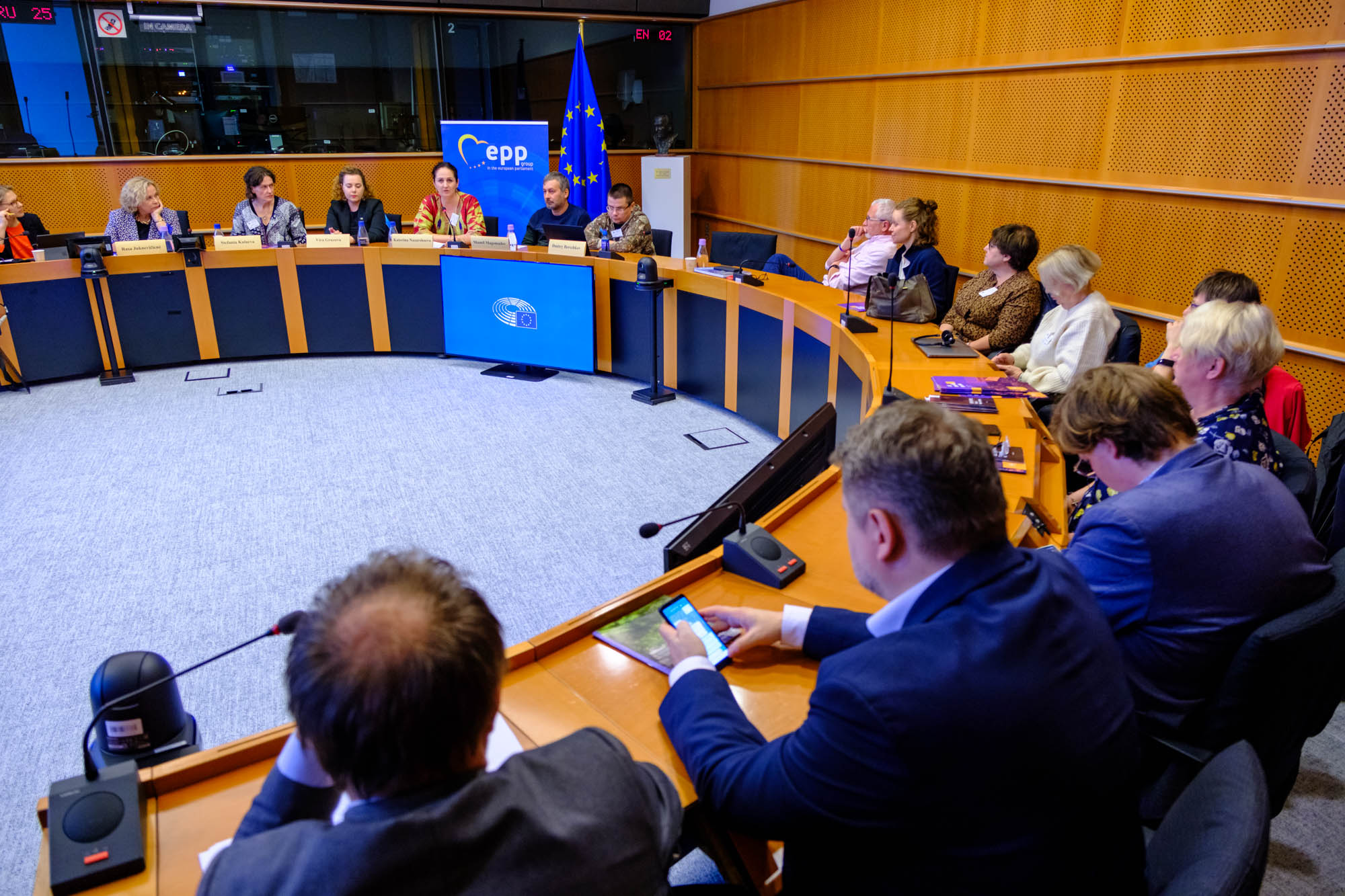25th of October in European Parliament was organised discussion “Opposing Russian Colonial Oppression: Voices of Different Peoples”. The speakers were experts from Ukraine, Central Asia, Caucasus, Siberia and Far East . The event was hosted by MEP Rasa Juknevičienė in cooperation with the Anti-Discrimination Centre Memorial and marked the 10th Anniversary of ADC Memorial work in Brussels (here is the summary of the main achievements of the work of our experts in this decade).

Stefania Kulaeva, Head of the Anti-Discrimination Centre Memorial, thanked everyone who agreed to take part in the discussion, especially the organizers of the event in the European Parliament and the speakers. On behalf of ADC Memorial, she said that for all 10 years of work from Brussels, the organization has been protecting the rights of minorities – Roma in Europe, indigenous peoples of Siberia and the Far East, minorities of Central Asia – Pamiris, Dungans, Karakalpaks, Mugats and others. Organizing this discussion, ADC Memorial considers it important to give the floor to representatives of different peoples struggling with the colonial oppression of Russia, opposing discrimination and racism. The voices of all peoples are significant – among them there are the voices of large peoples, representatives of different countries, and also the voices of very small peoples (or nations) who cannot create an independent state, but the fight against discrimination, for their rights and dignity is equally important for all of them.
Vira Gruzova (ADC Memorial) spoke about her personal experience of gaining Ukrainian identity, inextricably linked with the struggle for democracy and civil rights and independence of Ukraine. Many residents of Ukraine, especially the younger generation, have gone this way: from apolitical position and lack of understanding of the catastrophic impact of Russia’s colonial policy, through involvement in civil and political activism, fight against corruption, participation in two revolutions. And after the beginning of Russia’s invasion to Ukraine, it became finally clear that the independence of Ukraine and the opposition to Russian colonial aggression, adherence to democratic values are matters of physical survival of the inhabitants of Ukraine. The personal history of Vera and many other Ukrainians shows that democratic rights should be constantly fought for, since reactionary forces use any weakness of opponents; this fight should be serious, civil rights protection mechanisms should be strong and effective, since the price of the issue is the independence of the country and the lives of its citizens; we cannot wait for violent conflicts – we need to prevent them and take measures when dialogue is still possible, and not when weapons are used.
Katerina Nazarshoeva, expert on minority rights in Central Asia, spoke about aspects of Russian colonialism in this region. While in the past it rather related to the use of natural resources, now the colonial pressure has taken the form of mass labor migration, brutal exploitation of workers from Central Asia, against the background of draconian migration rules, enormous corruption of Russian migration authorities, police arbitrariness, manifestations of racism at various levels. After the outbreak of Russia’s war against Ukraine, Central Asians are paying a terrible price for their migration and for the region’s dependence on Russia: migrants and recently naturalized citizens are recruited and conscripted into the Russian army, they are involved in construction work in the occupied territories of Ukraine. Thus, Central Asians become participants in war crimes.
Shamil Magomedov, lawyer who has worked with Memorial for many years, spoke about the perception and consequences of Russia’s colonial policy in Dagestan. He mentioned the following problems: ignoring the opinion of the population of Dagestan when making important decisions (in particular, in 2010, Russia arbitrarily transferred to Azerbaijan two villages of the Magaramkent district of Dagestan, together with adjacent pastures and the Samur riverbed); massive violation of the rights of Dagestan residents through their arbitrary inclusion in the lists of those allegedly involved to extremism as part of semi-official “preventive measures”; racism towards Dagestanis living in other regions of Russia (when looking for housing and employment, profiling and arbitrariness of law enforcement and judicial authorities, hate speech in the state media). The speaker stressed that there is widespread scepticism in Dagestan society about the possibility of gaining sovereignty, since such an attempt by neighboring Chechnya turned into radicalization and increased authoritarianism.
Two presentations were devoted to the rights of indigenous peoples living in Russia.
Yana Tannagasheva, a representative of the Shor indigenous people of South Siberia, spoke about the catastrophic impact of the war on indigenous communities. They are disproportionately affected by the mobilization, as they live in the poorest regions of Russia, they are subjected to forced conscription and recruitment, and sometimes join the army voluntarily, as they see contract military service as the only opportunity to earn money.
Dmitry Berezhkov, the editor of the Indigenous Russia portal, spoke about the manifestations of colonialism against the indigenous peoples of the North, Siberia, and the Far East. He stressed that special attention should be paid to the small peoples who, under any state system, will be in the minority. Therefore, it is critically important for them that the state where they live should be democratic, protects human rights and the specific rights of minorities and indigenous peoples.









 Feedback
Feedback